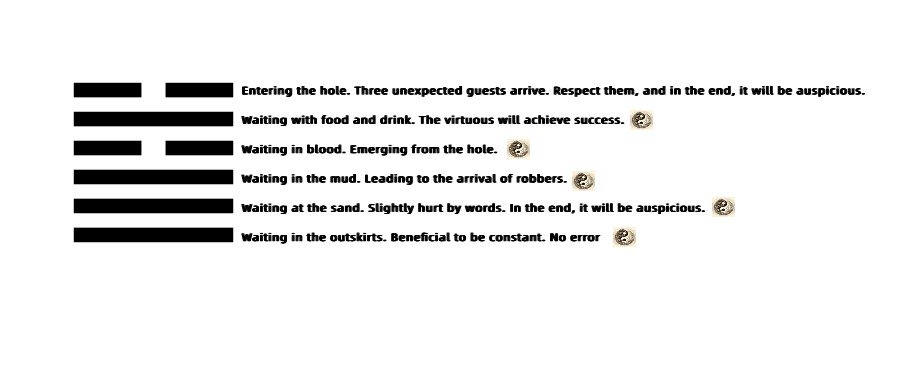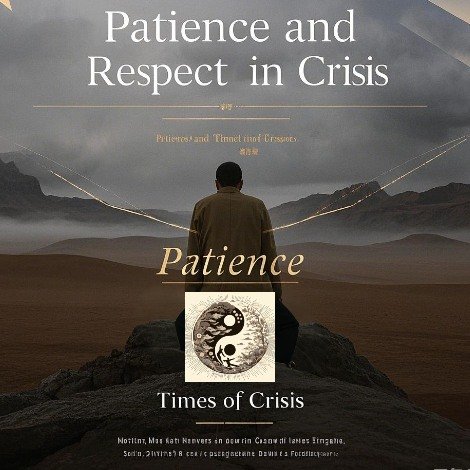I Ching Hexagrams:Need Trigram(䷄)
The hexagram “Need” (需)䷄ represents waiting, or the idea of advancing only when the right moment arrives. The hexagram is made up of two components: Qián (乾), symbolizing Heaven, and Kǎn (坎), which represents Water. In this case, Water is metaphorically seen as clouds in the sky. These clouds have not yet turned into rain, indicating that action is not yet appropriate. Just as clouds in the sky will eventually turn into rain according to the laws of nature, the right time for action will arrive naturally, and one should wait for it without rushing.

Looking at the structure of the hexagram, Qián represents strength and vitality, while Kǎn symbolizes danger and the potential for being trapped. When someone is strong but finds themselves in a situation of risk, it is wise to refrain from rushing forward and to wait for the right moment. Moving too soon will lead to danger, but waiting for the right moment will lead to success. In the lower trigram (Qián), all three yang (strong) lines suggest restraint and waiting. In the upper trigram (Kǎn), progress is only made when the right conditions are met.
Initial Nine
Waiting in the outskirts. Beneficial to be constant. No error
The phrase “有孚” (yǒu fú) refers to sincerity and integrity. In the context of the hexagram, the ninth line (the central and most important line) is in a strong and correct position but is trapped in the dangerous Kǎn. Despite this, because the ninth line possesses integrity and sincerity, it will patiently wait, and eventually, it will be able to overcome the obstacles and succeed. The hexagram advises that, during times of difficulty, one must stick to the right path and wait for the proper time to act. Haste will lead to failure, but patience and integrity will lead to success.
Interpretation:
When faced with a difficult or dangerous situation, if one cannot control their impulsiveness and acts prematurely, they may face disastrous consequences, similar to how a ship may capsize when crossing a great river. However, if one follows the way of waiting and does not rush, but instead moves in harmony with the situation, success is assured. In other words, those who wish to achieve something significant must cultivate sincerity and integrity within themselves, remain strong but balanced, and wait for the right time to act in order to succeed.

Initial Nine (九二)
“需于沙。小有言。终吉。”
“Waiting at the sand. Slightly hurt by words. In the end, it will be auspicious.”
The second line, 九二 (Jiǔ Èr), symbolizes waiting at a sandy place near water, but not yet fully immersed. “沙” (sand) indicates a place that is close to the danger represented by water, but not yet in it. “小有言” means minor verbal harm or a small issue caused by words, representing a slight disturbance or a small setback. Despite being close to danger, 九二 is not yet in it and has only experienced minor harm. The line also represents a person who has strength (yang) but is in a passive, yielding position (yin), maintaining balance and moving in harmony with both strength and softness. By waiting patiently and not rushing into action, this line suggests that although there may be small setbacks, everything will eventually turn out well.
Interpretation:
When facing rumors or minor slander, it’s often best to follow the principle “the clean will stay clean, and the muddy will stay muddy.” In other words, one should patiently wait and not rush to confront the issue or fight back. Rushing into the situation might escalate things unnecessarily. Patience, combined with integrity, will eventually lead to a favorable outcome.
Third Nine (九三)
“需于泥。致寇至。”
“Waiting in the mud. Leading to the arrival of robbers.”
The third line, 九三 (Jiǔ Sān), represents being in the mud near water, signifying a situation that is even more dangerous than 九二. “泥” (mud) indicates a treacherous place, a step closer to disaster. “致寇至” means that one’s impatience or rash actions might invite trouble, symbolized by the “robbers” (寇), representing a significant disaster or harm. This line warns that the individual in this position is overly eager or impulsive and is not waiting for the right time, leading to unnecessary peril.
Interpretation:
For example, after the Opium War, China found itself at the mercy of Western imperial powers, a situation represented by “需于泥” (waiting in the mud). During this time, the Qing government failed to use patience and wisdom and instead blindly acted in the Boxer Rebellion (an anti-imperialist movement). This rashness led to greater suffering, as the Eight-Nation Alliance invaded Beijing, resulting in humiliation and loss of sovereignty. In this case, the failure to wait led to disaster, just as 九三 warns.
Fourth Six (六四)
“需于血。出自穴。”
“Waiting in blood. Emerging from the hole.”
The fourth line, 六四 (Liù Sì), suggests that the individual is now in a more perilous situation, symbolized by “blood” (血), indicating injury or harm. “穴” (hole) represents a place of danger, a situation where one is trapped or stuck. However, the person in this line is capable of handling adversity due to their adaptability and patience, as symbolized by their position of yielding (yin). With help from others (represented by the previous line, 九五), this person will eventually find a way out of the danger and emerge victorious.
Interpretation:
This is like a chess player in a disadvantageous position, hoping to turn the game around by making an unexpected move. Although such moves may catch the opponent off guard, they often expose weaknesses and lead to failure. Instead, playing patiently and steadily will allow for success when the right moment arrives. In this case, patience will lead to eventual success.
Fifth Nine (九五)
“需于酒食。贞吉。”
“Waiting with food and drink. The virtuous will achieve success.”
The fifth line, 九五 (Jiǔ Wǔ), represents a noble and virtuous leader. “酒食” (food and drink) symbolizes the cultivation of inner strength and the sharing of resources with others. Despite being in a dangerous situation, the person in this line is endowed with the strength and wisdom to navigate it. They do not rush into action but wait patiently, understanding that success is not achieved through hasty action but through steady and virtuous conduct. The line suggests that by following the correct path, one’s efforts will eventually lead to success.
Interpretation:
As the great Northern Song writer Su Dongpo (1036-1101) noted in his essay “送张琥” (Farewell to Zhang Hu), the success of the wealthy’s lands comes not only from the abundance of resources but from allowing them to replenish over time through crop rotation. Similarly, wisdom and skill must be accumulated over time. Patience in learning and waiting for the right moment is key to achieving great things. This is the essence of the line “需于酒食. 贞吉”, which emphasizes the importance of patience, virtue, and waiting for the right moment to achieve success.
Upper Six (上六)
“入于穴。有不速之客三人来。敬之终吉。”
“Entering the hole. Three unexpected guests arrive. Respect them, and in the end, it will be auspicious.”
The sixth line, 上六 (Shàng Liù), indicates the final, most dangerous stage. “穴” (hole) represents a place of danger or a trap. “不速之客” refers to people who arrive without being invited, unannounced guests. The “三人” (three people) represent the three yang lines of the lower trigram 乾 (Qián), which, though they do not directly correspond to 上六, come forward proactively as if they were invited. The situation described by 上六 is one where the time for waiting has passed, and the person is now forced to enter a difficult situation, symbolized by “入于穴” (entering the hole). In the earlier lines of the hexagram, the energy was about waiting and preparing; by the time we reach 九五, action is required, and the three yang lines of 乾 (the three “uninvited guests”) push forward in pursuit of progress. However, this forward movement can be threatening to 上六. Despite this, 上六 remains in a yielding position (yin), with a gentle and respectful attitude, handling the situation with care. By respecting these “uninvited guests” and not fighting against them, 上六 can ultimately turn the situation around and achieve success.
Interpretation:
This line can be likened to a situation where one is unexpectedly confronted with danger or a threat. For example, if someone lives in an area with poor security and is faced with a robbery, the best strategy might be to feign compliance with the robbers’ demands, keeping calm and waiting for the right moment to act. By being respectful and patient, one can avoid escalating the situation, buy time, and eventually find a way to escape or even turn the tables on the attackers. The principle of 敬之终吉 (respect them, and in the end, it will be auspicious) suggests that patience and tact in the face of adversity can lead to a positive outcome.
A Tale of Patience: The Taoist Eight Trigrams Tai Chi Brooch
In the serene town of Willow Creek, nestled amidst rolling hills, lived a watchmaker named Henry. Henry was no ordinary craftsman; his meticulousness stemmed from his deep appreciation for time and its mysteries. Hanging proudly in his shop was the Taoist Eight Trigrams Tai Chi Brooch, a stunning piece adorned with the hexagram “Need” (需), symbolizing patience and the wisdom of waiting for the right moment.
One autumn afternoon, a young woman named Clara visited Henry’s shop. She was embarking on a challenging journey—a legal battle to reclaim her family’s ancestral home. Over tea, Clara confided in Henry about her anxiety and eagerness to act swiftly. In response, Henry handed her the brooch.
“Let me tell you a story about this piece,” he began.
Henry explained that the hexagram “Need” tells of clouds in the sky that have yet to turn into rain. Just as nature follows its course, the hexagram reminds us that action must align with the right moment. The brooch features Qián, representing strength, and Kǎn, symbolizing danger. Together, they caution against rashness, urging restraint in moments of risk.
“Look at the initial nine,” Henry pointed to the lower trigram. “It teaches us that when the path is unclear, waiting with sincerity ensures eventual success. Clara, your strength lies in patience, not haste. Act prematurely, and like a ship crossing a turbulent river, you may capsize.”
Over time, Clara wore the brooch daily, its wisdom guiding her actions. She resisted the urge to respond to provocations from her adversaries and focused instead on quietly gathering evidence. As weeks turned into months, the tide shifted. Her opponents’ haste revealed their weaknesses, and Clara triumphed in court.
The Taoist Eight Trigrams Tai Chi Brooch had become her emblem of patience, reminding her that integrity and timing are the keys to navigating life’s challenges.
Wear it as a symbol of wisdom. Let its teachings inspire you to wait for the rain, knowing that when the time is right, your moment of action will come naturally.
The brooch is more than an accessory; it’s a storyteller. Gift yourself or a loved one this unique piece of Taoist wisdom. Find it now at YinYangRing.com.
